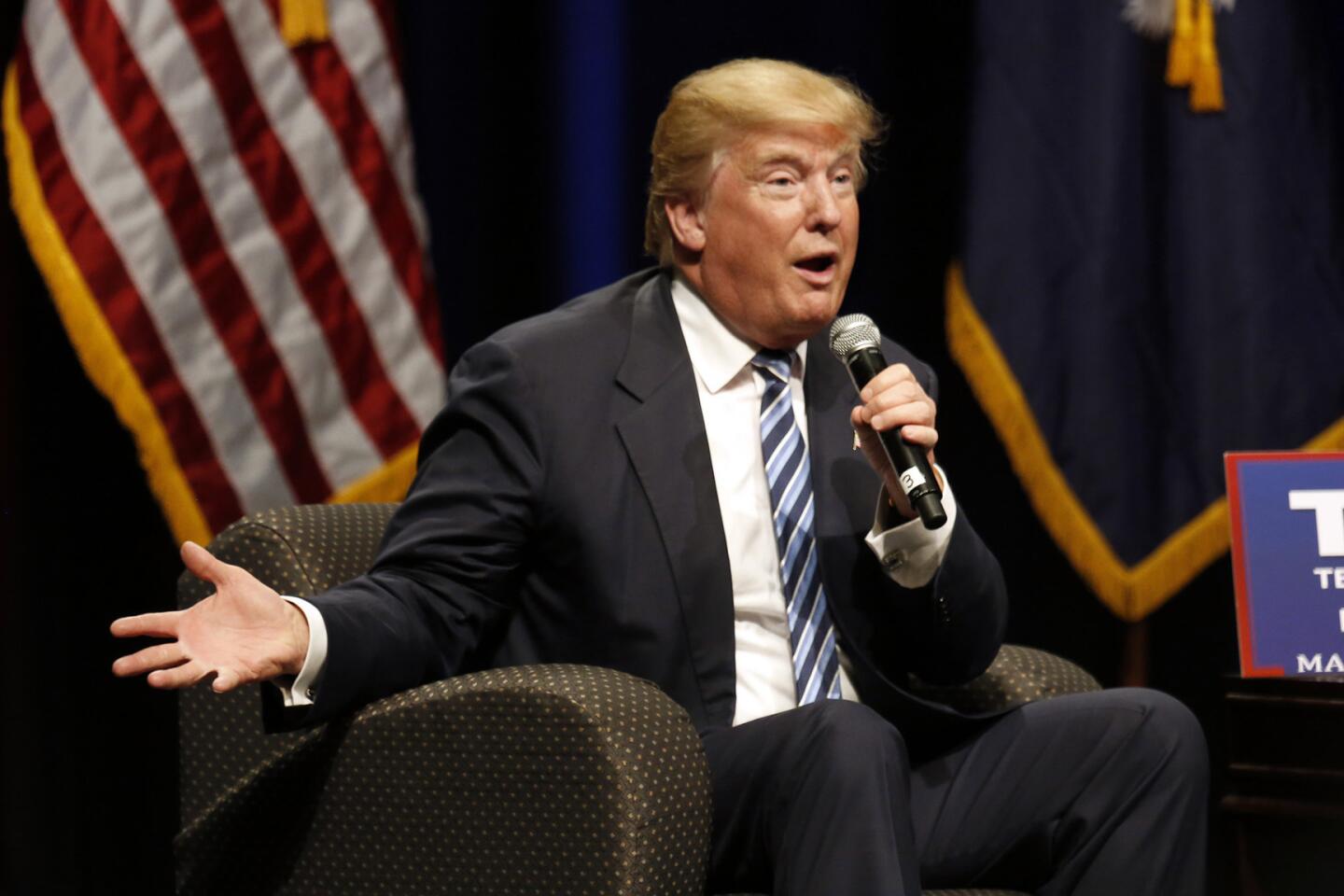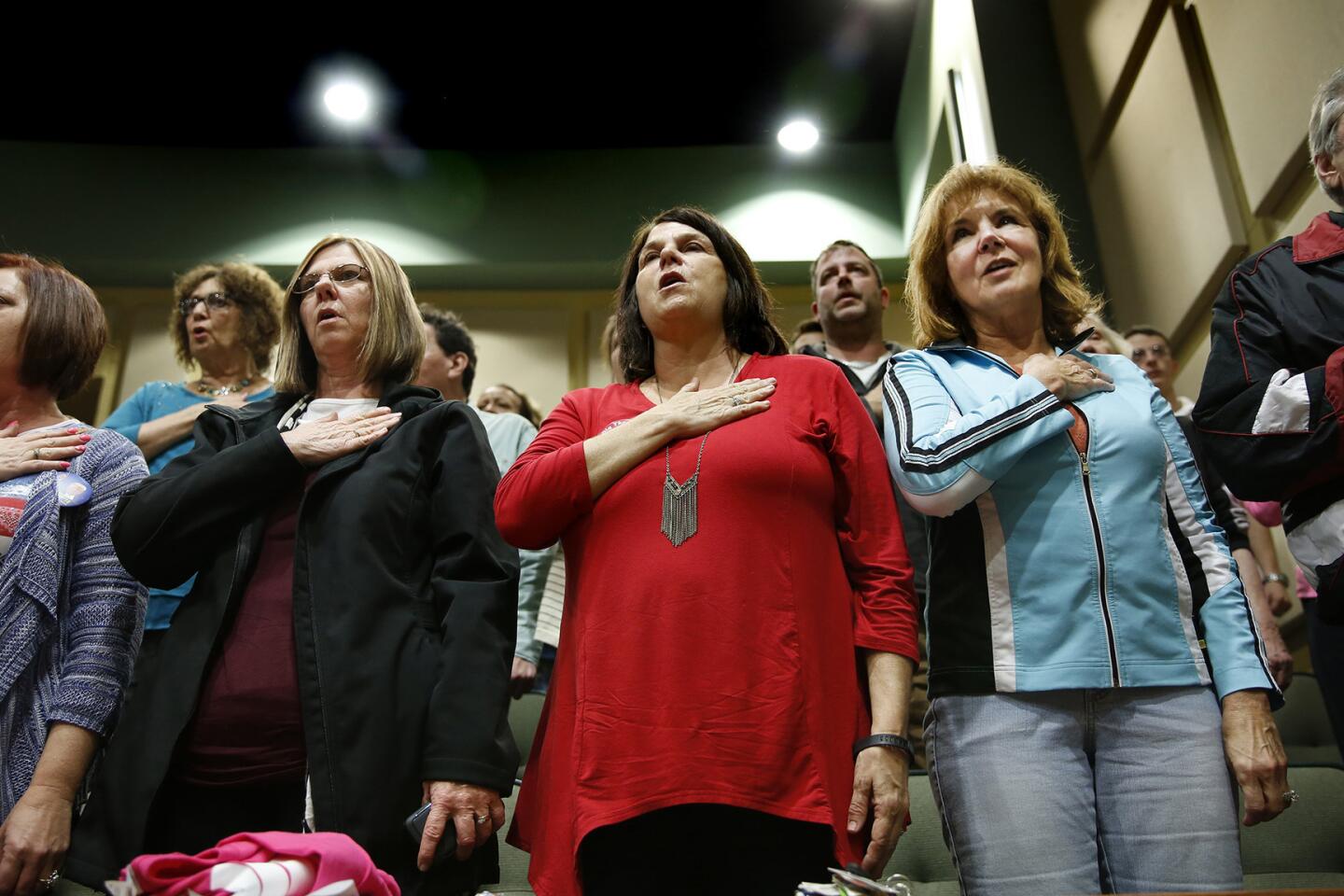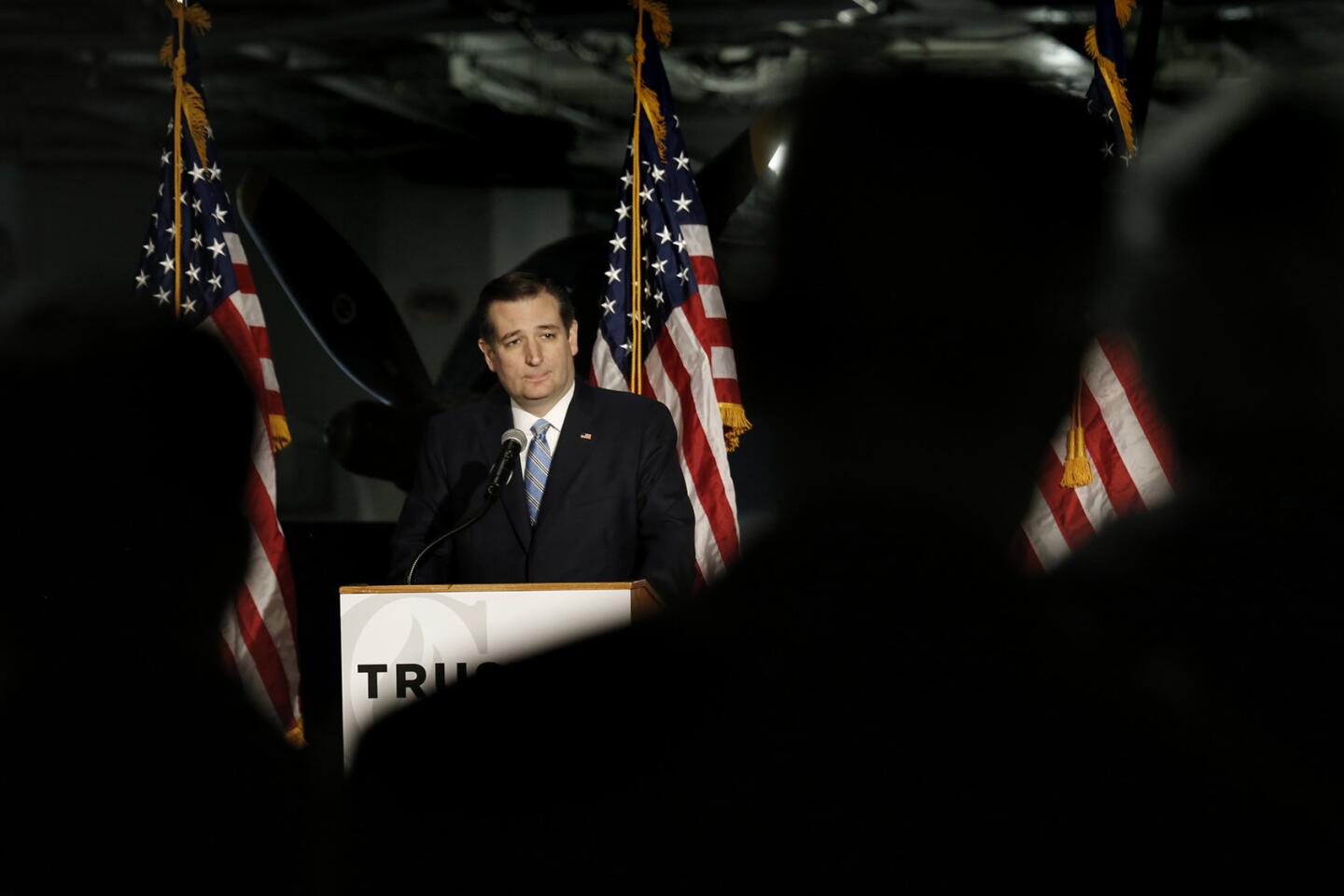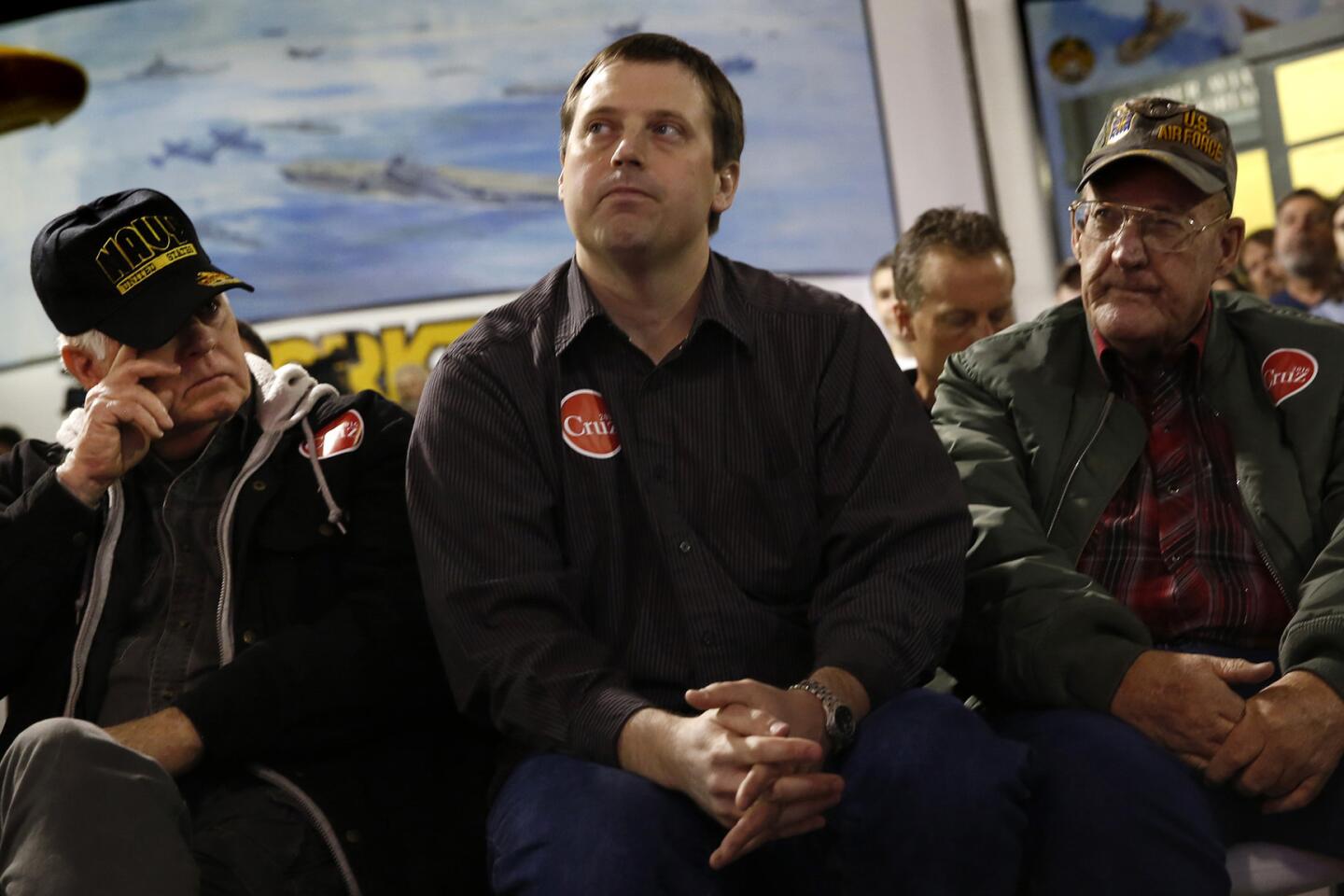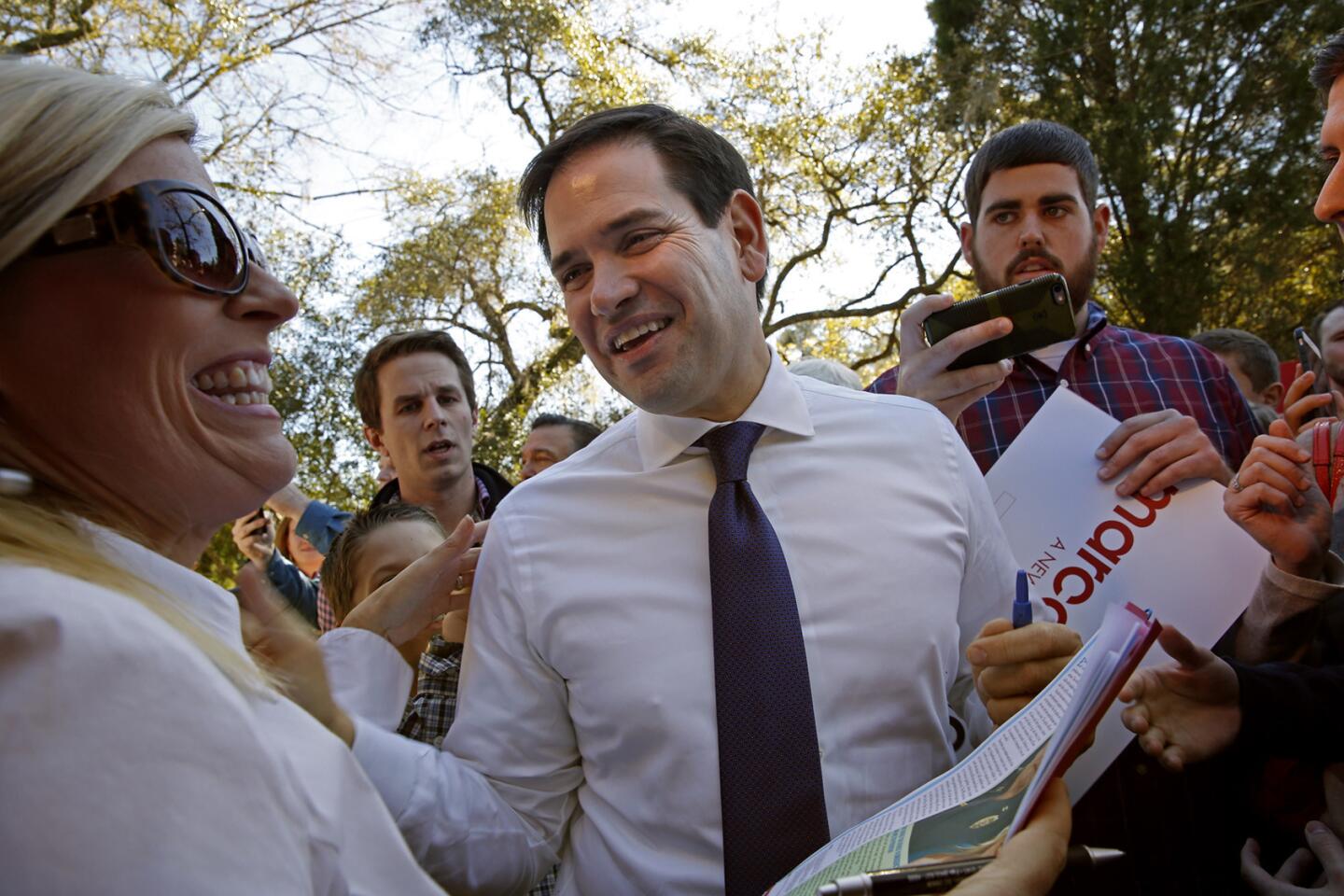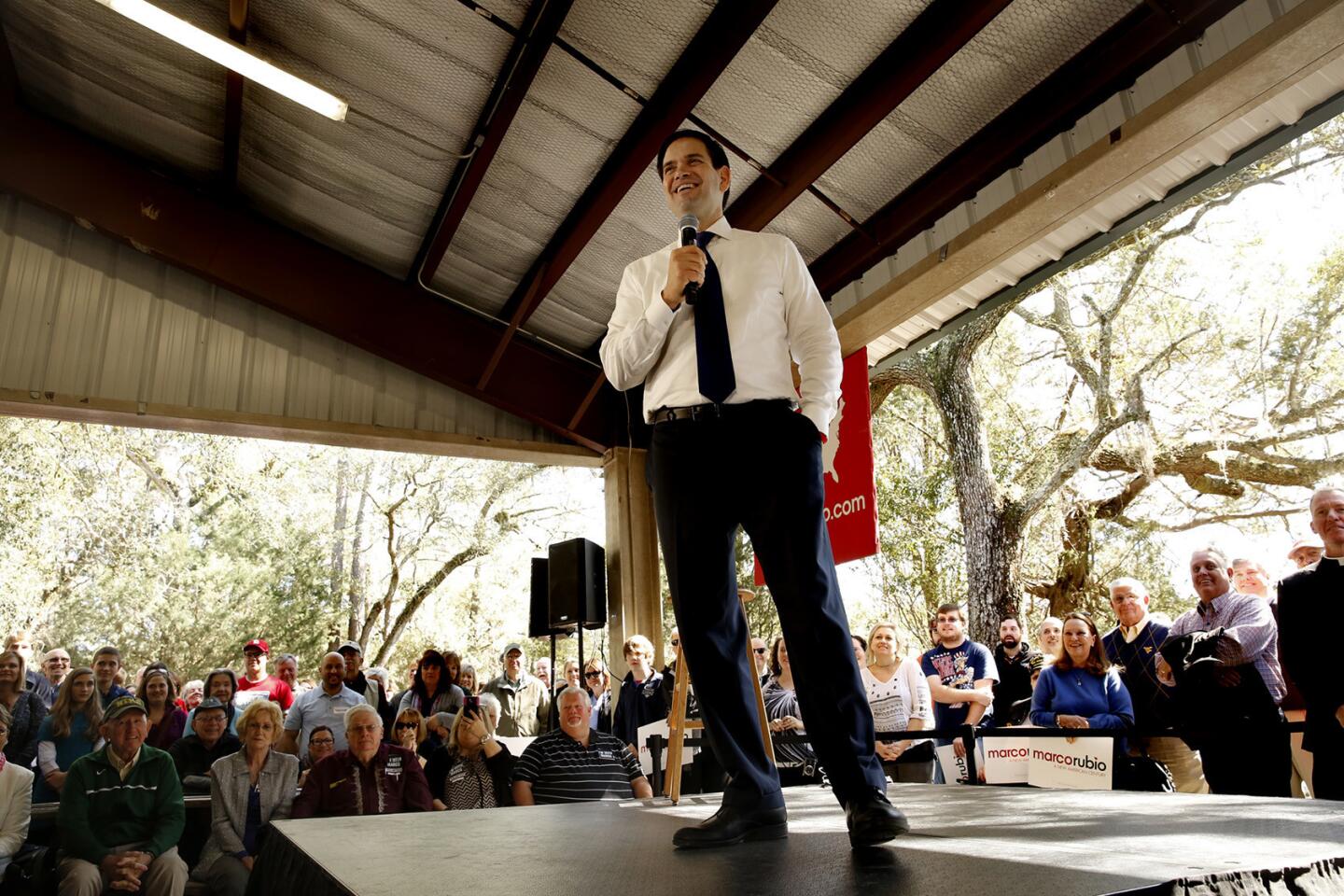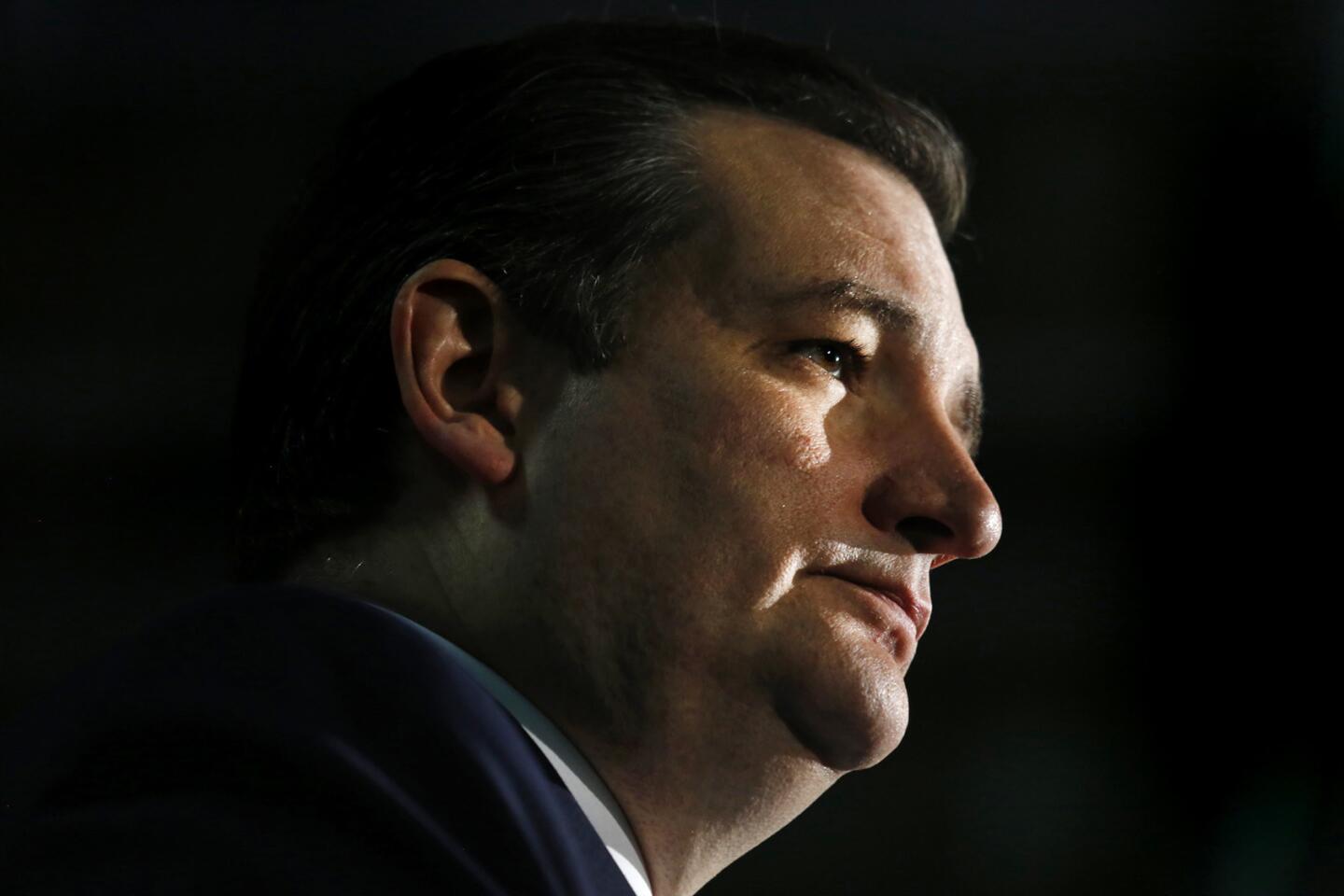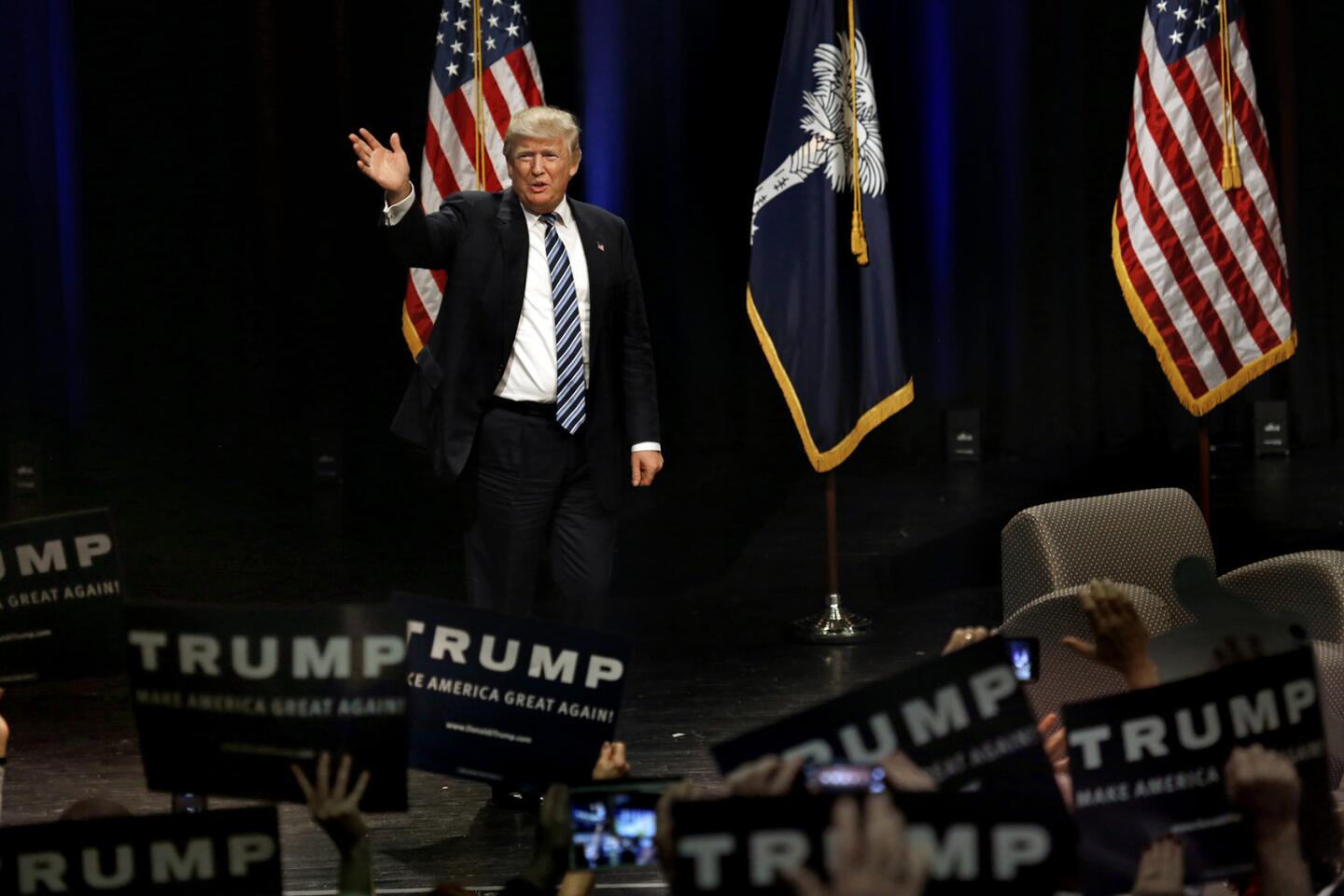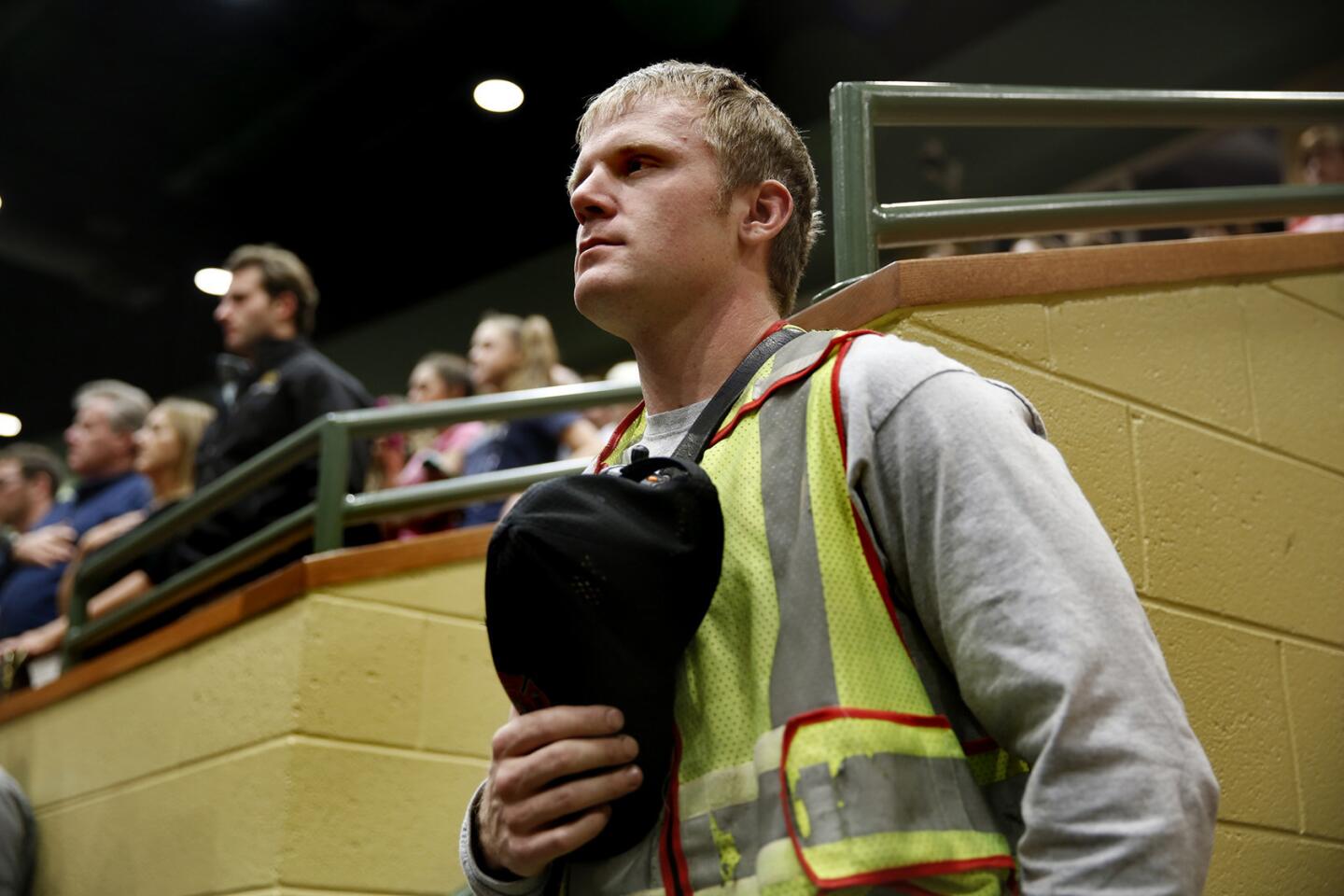Donald Trump supporter in South Carolina: ‘We’re voting with our middle finger’
- Share via
Reporting from Greenville, S.C. — Robert Bowers, a 50-year-old debt collector, conceded that Donald Trump may have gone “overboard just a little bit” when he attacked President George W. Bush, saying he lied about weapons of mass destruction in Iraq and failed to stop the Sept. 11 attacks.
But that did not stop Bowers, of Fountain Inn, S.C., from putting on a cap with Trump’s “Make America Great Again” slogan and walking through an icy cold parking lot so he could crowd into a raucous Trump rally Monday night.
“He’s not a polished politician,” Bowers said, neatly summing up both Trump’s appeal and liability.
TRAIL GUIDE: All the latest news on the 2016 presidential campaign >>
Early evidence suggests that Trump, as he has many times before, is maintaining his wide lead here despite criticism of his crude rhetoric, the latest example of which came in his attacks on Bush in Saturday’s debate and ever since. Though South Carolina has long prided itself on Southern manners and propriety, it is changing rapidly as outsiders increasingly move here. And Trump Nation may be immune to, and in some cases, even more than forgiving of his brash behavior.
“I hope he drops an F-bomb,” one fan said to another on the way into the rally.
One poll taken since the debate by Public Policy Polling, which works mostly for Democrats, shows Trump leading South Carolina’s Republican primary field by 17 percentage points, about the same lead he had going into the debate. His core support from about one in three Republicans remains steady here, in line with earlier national polling.
During past controversies, Trump’s supporters have stuck with him, believing his unvarnished criticism of immigrants, Muslims, women and Sen. John McCain’s war record shows he is willing to take on establishment interests and unwilling to bend to what he calls political correctness. Sometimes they agree with his comments, particularly on building a wall along the Southwestern border and barring Muslims from entering the country, according to polls. Sometimes they disagree but are more concerned with upending the political system.
“We’re voting with our middle finger,” said John Baldwin, a used-car dealer from Greenville.
Baldwin and his wife were passing out stickers and signs calling Trump’s supporters the “silent majority,” a phrase that dates to President Nixon and is used by Trump to assert that he is giving voice to beliefs that others are afraid to say out loud.
SIGN UP for the free Essential Politics newsletter >>
The question for Trump has always been whether he can build support beyond his loyal core, a task for him that will grow more important if he becomes the GOP nominee. A national poll taken this month by Quinnipiac University showed 59% of voters held an unfavorable view of Trump, compared with 34% who view him favorably. Other polls have shown similar results.
“I used to be a Trump supporter — up until Saturday night,” said Herb Riggs, a retired builder in Florence, who attended a town hall with Florida Sen. Marco Rubio on Monday, and is now considering him, along with Texas Sen. Ted Cruz. “He looked like a schoolyard bully.”
Betty Carter also didn’t like the way Trump went after former President Bush. But she’s still sticking with him.
“He needs to know where he is: He’s in Bush country,” she said waiting in a long line to see him Tuesday afternoon at Riverview Park in North Augusta, where she moved more than 15 years ago to care for her grandkids. “I didn’t like it, but I’m still voting for him.”
Marsha Daigle, a retired federal employee at Trump’s rally Monday in Greenville, said she did not like the bickering in the debate either and worries that it will make it more difficult for Trump to broaden his support.
“It rubs a lot of people the wrong way,” she said.
She and her 38-year-old son, Brent Gay, who said he had never voted, said their own support for Trump remains solid because they believe he will halt illegal immigration and help Americans get more jobs.
Like several people interviewed at Trump’s Monday night rally, Daigle was not originally from South Carolina, having lived in California and several other states before retiring in Spartanburg. Demographic data show an increasing number of residents have moved from out of state, perhaps loosening the traditional boundaries of Southern politeness.
In 2000, 64% of the population was state-born, according to census data, but by 2013, the number of resident born in the Palmetto State had fallen to 58%.
GOP strategist Kevin Madden, a former Mitt Romney spokesman, said he believes Trump may yet suffer in Saturday’s South Carolina primary, noting that attitudes here often shift in the final days of the campaign.
“These are views that are outside the mainstream of Republican thought,” Madden said. “His views in that debate were more associate with Code Pink and the liberal left and that might give people pause, rather than reinforce what they liked about some of his debate performances.”
Monday night’s rally was typical of Trump’s performances, which feel like arena rock concerts as much as political events. Thousands packed into the TD Convention Center. Many stood along the sides of the cavernous convention hall when the seats ran out. Others were sent to an overflow room or turned away. Giant screens lit up Trump’s face; spotlights vacillated in front of the stage; Van Halen music blared.
“Didn’t you love this last debate?” Trump said to cheers. “They came at me from every angle.”
Trump, as he often does, riffed from topic to topic. He mocked Florida Gov. Jeb Bush for his debate performance and claimed the audience was stacked with his special-interest supporters.
He repeated his criticism of President George W. Bush’s decision to invade Iraq, but did not mention Bush, who is popular among the state’s Republicans, by name during that portion of the speech.
“We shouldn’t have gone into Iraq. That was a big mistake because it destabilized the whole Middle East,” Trump said. “Some people say ‘Oh, don’t say that.’”
“Everything you see right now is an offshoot of that decision,” he added, before launching into criticism of President Obama’s handling of the withdrawal from Iraq.
Later, he returned to the topic, even offering praise for Saddam Hussein, as a bad guy who nonetheless kept Iraq from disintegrating into sectarian violence and spawning terrorist groups attacking the West.
Human rights groups have estimated that Hussein, who was hanged in 2006, killed hundreds of thousands of people.
“Saddam Hussein killed terrorists,” Trump said. “He didn’t do it politically correct. He found a terrorist, they were gone within five seconds, OK. With us, we find a terrorist, it’s going to be 25 years and a trial.”
The crowd laughed, hollered and waved signs.
Bierman reported from Greenville and Mascaro from Columbia and North Augusta, S.C.
Follow @noahbierman and @LisaMascaro on Twitter.
MORE POLITICS NEWS
Why evangelicals are splintering and what it means for the GOP
In Nevada, Sanders volunteers campaign with rag-tag enthusiasm
Why Kamala Harris is unlikely to be a Supreme Court nominee
More to Read
Sign up for Essential California
The most important California stories and recommendations in your inbox every morning.
You may occasionally receive promotional content from the Los Angeles Times.
